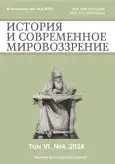Деятельность генерального секретаря ООН Трюгве Ли в 1946–1949 гг.: оценки американской прессы
- Авторы: Москвин И.Л.1, Запарий Ю.В.1
-
Учреждения:
- Уральский федеральный университет имени первого Президента России Б.Н. Ельцина (УрФУ)
- Выпуск: Том 6, № 4 (2024)
- Страницы: 81-86
- Раздел: ДИСКУССИОННЫЕ ПРОБЛЕМЫ ВСЕОБЩЕЙ ИСТОРИИ И МЕЖДУНАРОДНЫХ ОТНОШЕНИЙ
- URL: https://bakhtiniada.ru/2658-4654/article/view/281049
- DOI: https://doi.org/10.33693/2658-4654-2024-6-4-81-86
- EDN: https://elibrary.ru/LIIBCX
- ID: 281049
Цитировать
Аннотация
В отечественной историографии существует распространенное мнение о том, что Генеральный секретарь ООН Трюгве Ли с самого начала пребывания на своей должности стал прозападным политическим деятелем. На анализе публикаций из ведущих американских газет 1940-х гг. «The New York Times» и «The Washington Post» авторы статьи показывают, что Т. Ли часто становился объектом критики журналистов. В статье раскрываются особенности освещения работы Генерального секретаря американской прессой. Генерального секретаря ООН регулярно обвиняли в симпатии Советскому Союзу, критиковали некоторые из его инициатив, по ряду ключевых вопросов коллективной безопасности в прессе разворачивались целые дискуссии. Сделан вывод о том, что оценки деятельности Т. Ли колебались в зависимости от ситуации на международной арене, мнений издательств и публицистов, а также изменения внешнеполитических интересов администрации Трумэна. На основе анализа источников показано, что деятельность Генерального секретаря в указанный период в самих США не воспринималась как проамериканская. В период с 1946 по 1949 гг. Т. Ли стремился выступать посредником между США и СССР, его активная позиция зачастую вызывала раздражение лидеров обоих сверхдержав, которые предпочитали более послушного главу международной организации по поддержанию мира.
Полный текст
Открыть статью на сайте журналаОб авторах
Иван Львович Москвин
Уральский федеральный университет имени первого Президента России Б.Н. Ельцина (УрФУ)
Автор, ответственный за переписку.
Email: m0skweeeen@gmail.com
ORCID iD: 0009-0001-8756-5885
SPIN-код: 6347-7961
магистрант
Россия, г. ЕкатеринбургЮлия Владимировна Запарий
Уральский федеральный университет имени первого Президента России Б.Н. Ельцина (УрФУ)
Email: zapary.iulia@urfu.ru
SPIN-код: 1778-4473
кандидат исторических наук, доцент кафедры новой и новейшей истории Уральского гуманитарного института
Россия, г. ЕкатеринбургСписок литературы
- Гайдук И. В. В лабиринтах холодной войны: СССР и США в ООН, 1945–1965. М.: ИВИ РАН, 2012. 340 с.
- Запарий Ю. В. Миротворческие операции ООН: эволюция концепции и ее реализация (середина 40-х — начало 70-х гг. XX в.). Екатеринбург: УМЦ УПИ, 2005. 178 с.
- Запарий Ю. В. Организация Объединенных Наций и «Греческий вопрос» (1946–1950 гг.) // Imagines mundi: альманах исследований всеобщей истории XVI—XX вв., Екатеринбург: Издательство Уральского университета, 2008. 6 (1). С. 118–128.
- Калинин А. А. На переднем рубеже холодной войны: США, СССР и гражданская война в Греции (1944–1949 гг.). Киров: Издательство ВятГУ, 2018. 637 с.
- Москвин И. Л. Гражданская война в Греции 1946–1949 гг. в оценках американской прессы // Clio Moderna-2: европейские историко-культурные исследования в контексте глобальной истории: материалы всероссийской научной конференции, Екатеринбург: Изд-во Уральского государственного педагогического университета, 2022, С. 34–41.
- Начарова Е. Ю. СССР и иранский кризис в ООН // Клио. 2014. № 1 (85). С. 97–100.
- Негматова Ш. Р. Вопрос о роли и полномочиях Генерального секретаря ООН через призму деятельности первого Генерального секретаря Трюгве Ли // Вестник Таджикского национального университета. 2017. № 3–7. С. 16–23.
- Носенко Т. В. Политика СССР и США по вопросу создания государства Израиль (1945–1948) // Вестник Московского университета. Серия.25. Международные отношений и мировая политика, 2016. № 2. С. 55–89.
- Хайруллин Э. Р. Американская критика деятельности ООН в 1990-е гг.: основные направления // Вестник ОмГУ. 2006. № 2. С. 94–97.
- Chesterman S. (ed.). Secretary or General? The UN Secretary-General in World Politics. N. Y.: Cambridge University Press, 2007. 280 p.
- Gaglione A. The United Nations under Trygve Lie, 1945–1953. N. Y. Lanham: Md.: Scarecrow Press, 2001. 234 p.
- Ravndal E. 'A force for peace': Expanding the role of the UN Secretary-General under Trygve Lie, 1946-1953 [PhD thesis]. University of Oxford, 2015. 287 p.
- Ravndal E. In the Beginning: Secretary-General Trygve Lie and the Establishment of the United Nations. Bristol University Press, 2023. 204 p.
Дополнительные файлы








